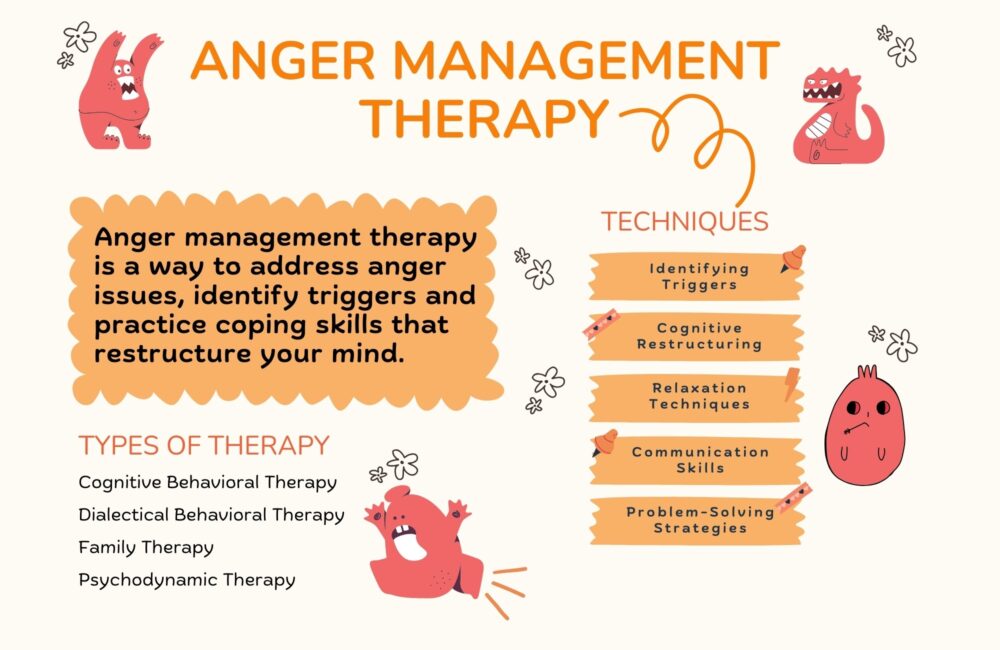To get angry isn’t always a problem, but to let your anger control you is a huge one. While anger is a common response to emotional thoughts and triggers, constant anger can be detrimental to physical and mental health, which is why it needs management. Anger management therapy is a way to address anger issues, identify triggers and practice coping skills that restructure your mind. Anger management helps you relax, channel your anger, understand, control, and express it in healthy ways that stabilize you and improve your mental well-being.
Understanding Anger: Effects and Implications for Health?
Anger is an emotion that triggers your sympathetic nervous system into a fight-or-flight response. This in turn initiates several physical changes like rapid breathing, increased blood pressure, an increased heart rate, and a flood of stress hormones invading your blood and muscles. It also increases your focus to tackle the situation at hand, either fighting it or moving forward. Anger isn’t always a physical problem; in fact, it is a useful emotion that helps us release negative emotions. However, becoming angry more frequently without healthy outlets to express it is an indication of chronic anger that requires anger management.
Continuous suppression of anger can result in the following problems:
- Increased stress and frustration
- Muscle Tension
- Spike in cortisol or stress hormone
- Hypertension
- Heart disease
- Headaches
- Skin disorders
- Digestive disorders
- Anxiety
- Social isolation
What is Anger Management?
Anger management is a specialized form of psychotherapy designed to assist individuals in recognizing, understanding, and managing their anger effectively. Essentially, it is learning how to cope with situations that make us angry. Anger management can include one-on-one counselling or group sessions with therapists to help you understand anger and its negative consequences. The focal point of anger management is to teach you coping strategies to develop healthier ways to deal with anger.
Anger Management Therapy Techniques
Anger management techniques are designed to help you identify the reasons that make you angry. During sessions, you will be encouraged to reflect on whether the intensity of your anger is justified and whether it is necessary to go to extremes. You may be asked whether your anger stems from a health condition or from experiencing consistent anger during childhood.
Anger management techniques will include:
- Identifying Triggers: Anger management therapy will always begin with helping one to understand anger and identify the triggers that contribute to the emotion. Both current and past triggers will be explored due to the possibility of anger being due to past trauma. Identification also helps understand the consequences of anger in relationships and daily life.
- Cognitive Restructuring: Cognitive restructuring identifies and challenges negative thought patterns that contribute to excessive anger. By altering distorted perceptions and replacing them with more rational thoughts, individuals can modify their emotional responses for a more balanced perspective.
- Relaxation Techniques: Relaxation techniques are integral to anger management therapy, helping individuals regain control over their physiological responses. Techniques such as deep breathing, progressive muscle relaxation, meditation, mindfulness, and guided imagery assist in calming the body’s stress response, and diffusing anger.
- Communication Skills: Anger management therapy often incorporates sessions focused on enhancing communication skills. Interpersonal communication can help you express and assert your feelings to avoid aggression, and be an active listener to others. Improved communication fosters healthier relationships and reduces the likelihood of misunderstandings that may trigger anger.
- Problem-Solving Strategies: Anger management therapy employs problem-solving strategies to address unresolved issues or challenges. Your therapist will help you identify problems, brainstorm solutions, and think up action plans. A proactive approach to anger helps individuals tackle issues directly, reducing unresolved frustrations that can lead to anger.
Anger management therapy will also explore if you are using anger as a shield to hide insecurities or other emotions like hate, hurt, shame, fear, anxiety, or childhood trauma.
In some cases, the therapist will also include additional techniques, such as:
Cognitive Behavioral Therapy (CBT)
CBT is a common therapy for anger management, helping one understand triggers and develop coping skills. It helps reframe thinking and feelings to alter one’s behavior for a healthier response to anger, which makes you calmer and more in control.
Dialectical Behavioral Therapy (DBT)
DBT, a form of CBT, can help individuals control chronic anger through emotional regulation, distress tolerance skills, mindfulness, and effective communication.
Family Therapy
Family therapy is most helpful in situations of anger and resentment within families. It helps improve communication, identify issues, and resolve them.
Psychodynamic Therapy
Psychodynamic therapy helps individuals with self-examination to identify the source and roots of anger, be it an unresolved issue or trauma. This helps in correcting unhealthy patterns through addressal and cognitive reframing.
Benefits of Anger Management Therapy
Despite anger being a destructive element in people’s lives, it has yet to receive the status of an official health condition needing a diagnosis like depression. Yet, anger can severely impact one’s mental and physical well-being, but with anger management therapy, positive changes are bound to occur with several benefits, such as:
Improved Emotional Regulation: Coping strategies help people regain control over their negative emotions, preventing anger from escalating into destructive behavior. Emotional regulation results in overall well-being.
Enhanced Interpersonal Relationships: Anger can strain relationships, leading to communication breakdowns and conflicts. Anger management therapy helps individuals communicate, improve relationships and express emotions in a constructive manner.
Improved Physical Health: Anger has several negative physical impacts on the body, as mentioned earlier. Anger management will help reduce such symptoms; moreover, you will find yourself in a calmer and more positive frame of mind to make more rational decisions in challenging situations.
Improved Mental Health: Unchecked anger can lead to anxiety, depression, paranoia, substance abuse and social isolation. Anger management through cognitive restructuring opens you up to a new perspective on life. You learn to focus better and gain more clarity of thought, which helps you channel your anger in healthier ways for better mental health.
Improves career: Negative expressions of chronic anger in the workplace can label you a toxic character difficult to deal with. Anger management helps you address your creative differences more amicably and professionally. Emotional control helps you accept constructive criticism and assert your opinion in a more productive manner.
Increased Self-Awareness: Anger management therapy encourages individuals to explore the root causes of their anger and understand their emotional triggers. A type of self-discovery, it promotes increased self-awareness, allowing individuals to take proactive measures to manage their emotions and regain control of their lives.
Prevents Legal and Social Consequences: Impulsive actions and decisions during uncontrolled bouts of anger can have legal ramifications. Learning to control your anger through therapy can help you avoid unwanted situations that lead to tension, expense, damaged relationships, and strained friendships.
Anger management is an evidence-based therapeutic approach aimed at helping individuals regain control of their lives and effectively manage their anger. The therapies outlined here extend beyond improved emotional regulation, providing a valuable resource for personal development. They help individuals foster emotional well-being to lead healthier, and more fulfilling lives
















